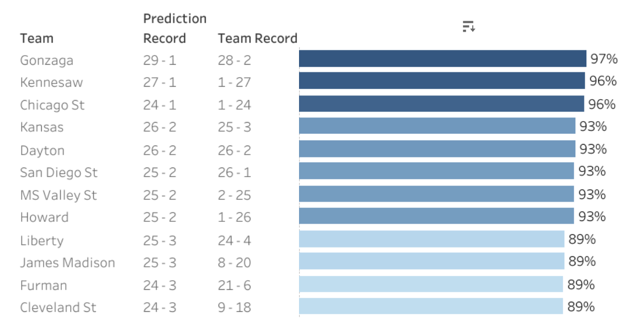March is here, meaning it is time to reignite the dream of capturing the ultimate bragging rights via college basketball bracket domination. You may be asking yourself where to begin. Let’s face it – last year, your tried and true method of picking by uniform color really let you down. Or maybe you have brushed elbows with greatness, only to fall short of winning it all and are looking for that edge. Well rejoice, dear reader, as Evolytics has you covered with the 2020 college basketball predictor.
Prediction Accuracy by Win Probability
Evolytics’ college basketball tool has correctly predicted 3,314 games in the 2020 season, going 414 for 626 in the previous week. The model-generated win probability is proving reliable, as the accuracy by probability interval below shows. When looking at the individual bands, however, an interesting observation is seen in the 80 – 89% win probability band. This band slightly underperformed, with a 76% prediction accuracy – is this a sweet spot to sniff out upsets?!
Team Predictions
Our model is most accurate when predicting teams that are on the far ends of the win/loss spectrum. On the flip side, teams with records closer to .500 tend to be tougher to predict.

In drilling in on Kansas, the two missed predictions were on matchups with win probabilities in the 50 – 59% band, which KU went on to lose to Villanova and Baylor. Baylor and KU have been closely matched this season, with the model projecting a 51% probability of KU to get the win the previous weekend.


Explore the full Tableau Public visualization, done by Evolytics’ own Jay Farias, and see how well we have predicted your favorite team.
Look for a new version of Evolytics college basketball predictor here once the teams are selected, so stay tuned and make this the year that your bracket tops the leaderboards!
